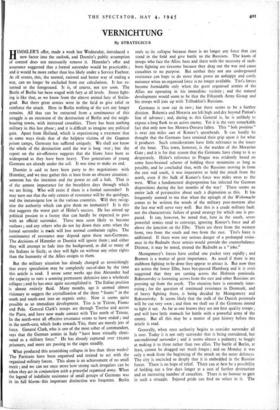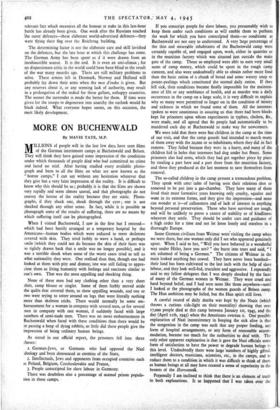VERNICHTUNG
By STRATEGICUS
HIMMLER'S offer, made a week last Wednesday, introduced a new factor into the outlook, and Doenitz's public assumption of control does not necessarily remove it. Himmler's offer and
assurance suggested that a formal surrender would be practicable ; and it would be more rather than less likely under a Service Fuehrer. At all events, this, the normal, rational and better way of ending a war, can no longer be excluded from our calculations. It has re- turned to the foreground. It is, of course, not too soon. The Battle of Berlin has been waged with fury at all levels. Street fight- ing is like that, as we know from the almost animal fury of Stalin- grad. But there great armies were in the fie:d to give relief or reinforce the attack. Here in Berlin nothing of the sort any longer remains. All that can be extracted from a continuance of this struggle is an extension of the destruction of Berlin and the neigh- bouring towns, with increased casualties. There has been nothing military in this last phase ; and it is difficult to imagine any political gain. Apart from Holland, which is experiencing a treatment that in some ways rivals that of the helpless victims of the Getman prison camps, Germany has suffered uniquely. We shall not know the whole of the destruction until the war is long over ; but the report on the air-offensive suggests that the blows have been as widespread as they have been heavy. Two generations of young Germans are already under the soil. It was time to make an end.
Doenitz is said to have been party to the negotiations with Himmler, and we may gather this at least from an obscure situation: someone has the intention and the power .to call a halt. That is of the utmost importance for the breathless days through which we are living. Who will resist if there is a formal surrender? It may turn out that the only centres of resistance will be the quislings, and the intransigent few in the various countries. Will they recog- nise the authority which can give them no immunity? It is this that suggests the worst part of Hitler's success. He has stirred up political passion to a frenzy that can hardly be expected to pass with an official surrender. These men seem likely to become outlaws ; and any others who do not lay down their arms when the formal surrender is made will lose normal combatant rights. The continuance of resistance may depend upon these non-Germans. The decisions of Himmler or Doenitz will ignore them ; and either they will attempt to fade into the background, as did so many of the Italians in Sicily, of they will fight on without any other rights than the humanity of the Allies assigns to them.
But the military situation has already changed so astonishingly that every speculation may be completely out-of-date by the time this article is read. I wrote some weeks ago that Alexander had the capacity to turn a seeming permanent defensive into a wholesale collapse ;-and he has once again accomplished it. The Italian position is almost entirely fluid. Many months, ago it seemed almost visionary to suggest the crystallisation of the three " fronts " in the south and south-east into an organic unity. Now it seems quite possible as an immediate development. Tito is in Trieste, Fiume and Pola. General Clark's troops are through Treviso and across the Piave, and have now made contact with Tito north of Trieste. In the north-west all effective resistance seems to have ended ; and in the north-east, which looks towards Tito, there are merely jets of force. General Clark, who is one of the most sober of commanders, says that the German armies in Italy "have been virtually elimi- nated as a thilitary force." He has already captured over 120,000 prisoners, and more are passing to the cages steadily.
What produced this astonishing collapse in less than three weeks? The Partisans have been organised and trained to act with the organised military forces. This alone is an achievement of no small merit ; and we can see once more how strong such irregulars can be when they act in conjunction with a powerful organised army. When the legend of indefinite resistance of small groups. of Germans was in its full bloom- this important distinction was forgotten. Berlin
reels to its collapse because there is no longer any force that can stand in the field and give battle to the Russians. The knots of troops who face the Allies here and there with the necessity of stub- born fighting are tiresome because they drag out the war and cause casualties to no purpose. But neither they nor any underground resistance can hope to do more than prove an unhappy and costly nuisance when an organised force is no longer available. Tito's forces become formidable only when the great organised armies of the Allies are operating in his immediate vicinity ; and the natural development would seem to be that the Fifteenth Army Group and his troops will join up with Tolbukhin's Russians.
Germany is now cut in two ; but there seems to be a further division. Bohemia and Moravia are left high and dry beyond Patton's line of advance ; and, daring as this General is, he is unlikely to expose a long flank to an active enemy. Yet it is the very remarkable fact that only now has Morava Ostrava fallen. This " bolt position " is over zoo miles east of Koniev's spearheads. It can hardly be thought that the Germans have retained their grip upon it for what it produces. Such considerations have little relevance to the issues of the hour. This town, however, is the warden of the Moravian Gate ; and it is for that reason that the Germans have clung to it so desperately. Hitler's reference to Prague was evidently based on some hare-brained scheme of holding these mountains as long as possible, and he concluded that, with the Russians moving in from the east •and south, it was imperative to hold the attack from the north, even if the bulk of Koniev's force was miles away to the west. What a fundamental disproportion has infected the German dispositions during the last months of the war! There seems an entire lack of perspective about such a disposition as this. It has frequently seemed to me that when the epitaph of the Wehrmacht comes to be written the words of the military post-mortem after the last war will serve very well. But this is a crude military fault. not the characteristic failure of grand strategy for which one is pre- pared. It can, however, be noted that, here in the south, seven powerful armies tend to converge, ignoring Koniev's force and all above the junction on the Elbe. There are three from the western front, two from the south and two from the east. Tito's force is additional. If there were any serious danger of a prolonged resist- ance in the Redoubt these armies would provide the counterbalance. Dittmar, it may be noted, treated the Redoubt as a " joke."
Montgomery's forces have settled one pocket very rapidly ; and Bremen is a matter of great importance. As usual if there is any stubborn fighting to be done they appear to attract it. But now they are across the lower Elbe, have bye-passed Hamburg and it is even suggested that they are cutting across the Holstein peninsula.
Rokossovsky is hastening across from the east and other Russians are pressing up from the south. The situation here is extremely inter- esting ; for the question of continued resistance in Denmark, and of heavy fighting there, is being decided by Montgomery and Rokossovsky. It seems likely that the stalk of the Danish peninsula will be cut very soon ; and then we shall see if the Germans intend to fight it out. As far as one knows they are not first quality troops ; and will have little stomach for battle with a powerful army of the enemy. But all this may be a matter of past history before this article is read.
Generally, when once authority begins to consider surrender all is over. Today it is not only surrender that is being considered, but unconditional surrender ; and it seems almost a pedantry to boggle at making it to three rather than two allies. The battle of Berlin, at least, cannot be dragged out much longer ; and on Monday it was only a week from the beginning of the attack on the outer defences. The city is encircled so deeply that it is embedded in the Russian forces. There is no hope of relief. There can at best be a possibility of holding out a few days longer at a cost of further destruction and an increasing number of casualties. There is no honour to gain in such a struggle. Injured pride can find no solace in it. The relevant fact which measures all the honour at stake in this last-hour battle has already been given. One week after the Russians reached the outer defences—these elaborate world-advertised defences—they were flying their flag over the Reichstag building.
The determining factor is not the elaborate care and skill lavished on the defences, but the late hour at which this challenge has come. The German Army has been spent- as if it were drawn from an inexhaustible source. It is the end. It is even an anti-climax ; for no dispassionate critic in the world could have been blind to the result of the war many months ago. There are still military problems to solve. These armies left in Denmark, Norway and Holland will probably lay down their arms when the mot d'ordre is given. But any reserves about it, or any seeming lack of authority, may result in a prolongation of the ordeal for these gallant, unhappy countries. The sooner the surrender is made the better for them. If time were given for the troops to degenerate into anarchy the outlook would be black indeed. What everyone hopes seems, on this occasion, the most likely development.



























 Previous page
Previous page